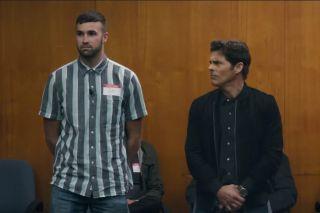RESILIENCE-
Embracing Life's Hardest Moments as Learning Opportunities.
Six ways to see life's hardships as merely "school fees."
When I think of the hardest moments of my life, ironically many have turned out to be blessings in disguise. While this is not the most severe example, one, in particular, was being pretty much kicked out of my PhD program at the University of Georgia in 2016. This was after I quit all my jobs in California (despite good momentum), packed my car full of my belongings, and drove across the country over a week, thus forfeiting my intern license to practice therapy in California (an unlicensed therapist is now called "associate", but before 2019 it was "intern").
The program in Georgia turned out to not be the right fit for me despite my best efforts. I mainly went because they offered to cover my tuition and pay me to study there, but I didn't vet the program carefully enough. The whole year was riddled with exhaustion, anxiety, insecurity, fear, insomnia, and exclusion. I was in therapy myself for most of the year to cope, and the only thing that made it tolerable was a lot of support from my family and friends. I was utterly devastated when I went back home; it felt like my career was over. Fast forward to today, however, and I can see that getting driven out of the Georgia program was one of the best things that ever happened to me. As the saying goes, "Fate loves irony." I thank all my professors in perpetuity for making me see what I couldn't back then: I'd thrive in the right program. In 2017, when I transferred to a doctoral program in San Diego, I began to succeed and now my business and career are doing exceptionally well.
I am deeply grateful I wound up in San Diego and happy that I didn't stay in Georgia in hindsight. I wouldn't have left, though, it I wasn't driven out! Ironically, the research and writing training from the University of Georgia significantly helped me develop my academic, professional, and personal writing. I worked hard in Georgia and it paid off: The learning and growth I experienced were unparalleled. It also helped me apply for and win scholarships. Almost half of the courses I took at Georgia counted towards my doctorate in San Diego, helping me save money and graduate earlier.
As my personal example demonstrates, life is a total rollercoaster; what seems like good or bad news now can turn out to be the opposite in the future. Every now and then you are able to discover a new high, a ceiling-breaking moment, whereas in other moments you may feel like you're falling deeper and deeper into hell. While these experiences can be incredibly tough, they present us with valuable opportunities to trust life and cultivate personal growth and learning.
Here I briefly underscore six key ways we can turn life's hardest moments into powerful learning and growing opportunities. Most of our hard moments really can be "school fees." If you work at this mindset shift like your life depended on it (as it kind of does), you can set yourself up to never really lose at the game of life.
1. Embrace Resilience
Resilience is the ability to bounce back from adversity and possibly also grow stronger in the process. It is a fundamental quality that enables us to turn life's hardest moments into learning opportunities. When we face difficulties, instead of succumbing to despair, we can choose, as hard as it may seem in the moment, to embrace resilience. This means recognizing our own inner strength and determination to overcome challenges. You likely know you have done it in the past and can do it again. What's something that you've mastered that you didn't think you would be good at in the past?
Hardship often reveals our true resilience, forcing us to confront our fears and doubts. Each time we endure a difficult experience, we build resilience, making us better equipped to handle future challenges. By acknowledging and appreciating our resilience, we learn to adapt and thrive in the face of adversity.
2. Take the Opportunity for Reflection and Self-Examination
Turning life's hardest moments into learning opportunities requires self-reflection and examination. When we encounter difficulties, it's essential to take a step back and ask ourselves tough questions. What led to this situation? What can we learn from it? How can we grow from it? Reflecting on our experiences allows us to gain valuable insights and wisdom. As long as we derive learning, meaning, understanding, and insight from it, even the worst things that happen to us can become gifts and sources of strength and wisdom over time. The lesson is likely cheap if you don't let it happen again!
As we reflect, we may discover our own biases, blindspots, or areas needing improvement. This self-awareness is a powerful and necessary tool for personal growth. By acknowledging our mistakes and learning from them, we can make better decisions and become more compassionate individuals.
3. Cultivate Empathy
Life's challenges often bring us into contact with the suffering of others. Experiencing hardship firsthand can foster empathy and compassion for those going through similar difficulties. This newfound empathy can lead to a desire to help and support others in their times of need. I'm sure I would be a terrible therapist if I didn't ever go through hardships: I would have no idea how my clients feel or what they need to hear.
Turning our pain into an opportunity to connect with others on a deeper level can be incredibly rewarding. By offering our understanding and support, we not only help others but also create a sense of purpose and fulfillment in our own lives.
4. Develop Problem-Solving Skills
As ironic as this may sound, life would be incredibly boring and possibly meaningless if we had no problems to solve. Difficult moments often require us to think critically and find solutions to complex problems in ways we wouldn't otherwise. These challenges can be seen as opportunities to develop and refine our problem-solving skills. When we encounter obstacles, we are pushed to explore new perspectives, seek creative solutions, and make informed decisions. Without obstacles, we wouldn't ever discover what we're truly capable of and a lot of our potential would be squandered.
By actively engaging in problem-solving during tough times, we become more adept at handling future challenges with confidence and competence. These skills are transferable to various aspects of our lives, contributing to our personal and professional growth.
5. Reevaluate Priorities
Hardship has a way of reshaping our priorities and helping us distinguish between what truly matters and what is superficial. Life's toughest moments can prompt us to reevaluate our values, goals, and aspirations. We may realize that some of our previous ambitions were misaligned with our authentic selves. In my Georgia example above, while my career backslid temporarily, I am fortunate to have been able to strengthen my relationship with friends and family, ironically, in ways that wouldn't have been possible if I hadn't gone through that. By using these moments as an opportunity to recalibrate priorities, we can make more meaningful life choices. This can lead to a greater sense of fulfillment and a life that aligns with our core values and desires.
6. Appreciate the Ups and Downs
There is no dark without light, and there is no hot without cold. Without the difficult moments, we would not fully appreciate the moments of joy, success, and achievement. These challenging times provide context and depth to our experiences, making the highs not only possible but more meaningful. In this spirit, I am perpetually thankful that I went through that experience in Georgia to appreciate more of my blessings in the present.
Conclusion
As corny as it sounds, it couldn't be truer: life's hardest moments, even if it may seem impossible at the moment, are not devoid of purpose. They are profound opportunities for growth, learning, and self-discovery. Embracing resilience, self-reflection, empathy, problem-solving skills, and reassessing priorities can help us navigate and transform adversity into valuable life lessons. When we view life's challenges as opportunities to learn and evolve, we empower ourselves to become more resilient, compassionate, and wise individuals. In doing so, we find that even in the darkest of times, there is the potential for growth and the opportunity to turn pain into strength. Mastering that skill is nothing less than a superpower.
RESILIENCE-
Embracing Life's Hardest Moments as Learning Opportunities.
Six ways to see life's hardships as merely "school fees."
When I think of the hardest moments of my life, ironically many have turned out to be blessings in disguise. While this is not the most severe example, one, in particular, was being pretty much kicked out of my PhD program at the University of Georgia in 2016. This was after I quit all my jobs in California (despite good momentum), packed my car full of my belongings, and drove across the country over a week, thus forfeiting my intern license to practice therapy in California (an unlicensed therapist is now called "associate", but before 2019 it was "intern").
The program in Georgia turned out to not be the right fit for me despite my best efforts. I mainly went because they offered to cover my tuition and pay me to study there, but I didn't vet the program carefully enough. The whole year was riddled with exhaustion, anxiety, insecurity, fear, insomnia, and exclusion. I was in therapy myself for most of the year to cope, and the only thing that made it tolerable was a lot of support from my family and friends. I was utterly devastated when I went back home; it felt like my career was over. Fast forward to today, however, and I can see that getting driven out of the Georgia program was one of the best things that ever happened to me. As the saying goes, "Fate loves irony." I thank all my professors in perpetuity for making me see what I couldn't back then: I'd thrive in the right program. In 2017, when I transferred to a doctoral program in San Diego, I began to succeed and now my business and career are doing exceptionally well.
I am deeply grateful I wound up in San Diego and happy that I didn't stay in Georgia in hindsight. I wouldn't have left, though, it I wasn't driven out! Ironically, the research and writing training from the University of Georgia significantly helped me develop my academic, professional, and personal writing. I worked hard in Georgia and it paid off: The learning and growth I experienced were unparalleled. It also helped me apply for and win scholarships. Almost half of the courses I took at Georgia counted towards my doctorate in San Diego, helping me save money and graduate earlier.
As my personal example demonstrates, life is a total rollercoaster; what seems like good or bad news now can turn out to be the opposite in the future. Every now and then you are able to discover a new high, a ceiling-breaking moment, whereas in other moments you may feel like you're falling deeper and deeper into hell. While these experiences can be incredibly tough, they present us with valuable opportunities to trust life and cultivate personal growth and learning.
Here I briefly underscore six key ways we can turn life's hardest moments into powerful learning and growing opportunities. Most of our hard moments really can be "school fees." If you work at this mindset shift like your life depended on it (as it kind of does), you can set yourself up to never really lose at the game of life.
1. Embrace Resilience
Resilience is the ability to bounce back from adversity and possibly also grow stronger in the process. It is a fundamental quality that enables us to turn life's hardest moments into learning opportunities. When we face difficulties, instead of succumbing to despair, we can choose, as hard as it may seem in the moment, to embrace resilience. This means recognizing our own inner strength and determination to overcome challenges. You likely know you have done it in the past and can do it again. What's something that you've mastered that you didn't think you would be good at in the past?
Hardship often reveals our true resilience, forcing us to confront our fears and doubts. Each time we endure a difficult experience, we build resilience, making us better equipped to handle future challenges. By acknowledging and appreciating our resilience, we learn to adapt and thrive in the face of adversity.
2. Take the Opportunity for Reflection and Self-Examination
Turning life's hardest moments into learning opportunities requires self-reflection and examination. When we encounter difficulties, it's essential to take a step back and ask ourselves tough questions. What led to this situation? What can we learn from it? How can we grow from it? Reflecting on our experiences allows us to gain valuable insights and wisdom. As long as we derive learning, meaning, understanding, and insight from it, even the worst things that happen to us can become gifts and sources of strength and wisdom over time. The lesson is likely cheap if you don't let it happen again!
As we reflect, we may discover our own biases, blindspots, or areas needing improvement. This self-awareness is a powerful and necessary tool for personal growth. By acknowledging our mistakes and learning from them, we can make better decisions and become more compassionate individuals.
3. Cultivate Empathy
Life's challenges often bring us into contact with the suffering of others. Experiencing hardship firsthand can foster empathy and compassion for those going through similar difficulties. This newfound empathy can lead to a desire to help and support others in their times of need. I'm sure I would be a terrible therapist if I didn't ever go through hardships: I would have no idea how my clients feel or what they need to hear.
Turning our pain into an opportunity to connect with others on a deeper level can be incredibly rewarding. By offering our understanding and support, we not only help others but also create a sense of purpose and fulfillment in our own lives.
4. Develop Problem-Solving Skills
As ironic as this may sound, life would be incredibly boring and possibly meaningless if we had no problems to solve. Difficult moments often require us to think critically and find solutions to complex problems in ways we wouldn't otherwise. These challenges can be seen as opportunities to develop and refine our problem-solving skills. When we encounter obstacles, we are pushed to explore new perspectives, seek creative solutions, and make informed decisions. Without obstacles, we wouldn't ever discover what we're truly capable of and a lot of our potential would be squandered.
By actively engaging in problem-solving during tough times, we become more adept at handling future challenges with confidence and competence. These skills are transferable to various aspects of our lives, contributing to our personal and professional growth.
5. Reevaluate Priorities
Hardship has a way of reshaping our priorities and helping us distinguish between what truly matters and what is superficial. Life's toughest moments can prompt us to reevaluate our values, goals, and aspirations. We may realize that some of our previous ambitions were misaligned with our authentic selves. In my Georgia example above, while my career backslid temporarily, I am fortunate to have been able to strengthen my relationship with friends and family, ironically, in ways that wouldn't have been possible if I hadn't gone through that. By using these moments as an opportunity to recalibrate priorities, we can make more meaningful life choices. This can lead to a greater sense of fulfillment and a life that aligns with our core values and desires.
6. Appreciate the Ups and Downs
There is no dark without light, and there is no hot without cold. Without the difficult moments, we would not fully appreciate the moments of joy, success, and achievement. These challenging times provide context and depth to our experiences, making the highs not only possible but more meaningful. In this spirit, I am perpetually thankful that I went through that experience in Georgia to appreciate more of my blessings in the present.
Conclusion
As corny as it sounds, it couldn't be truer: life's hardest moments, even if it may seem impossible at the moment, are not devoid of purpose. They are profound opportunities for growth, learning, and self-discovery. Embracing resilience, self-reflection, empathy, problem-solving skills, and reassessing priorities can help us navigate and transform adversity into valuable life lessons. When we view life's challenges as opportunities to learn and evolve, we empower ourselves to become more resilient, compassionate, and wise individuals. In doing so, we find that even in the darkest of times, there is the potential for growth and the opportunity to turn pain into strength. Mastering that skill is nothing less than a superpower.









